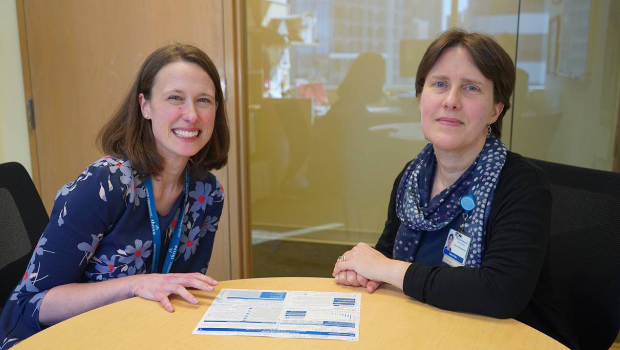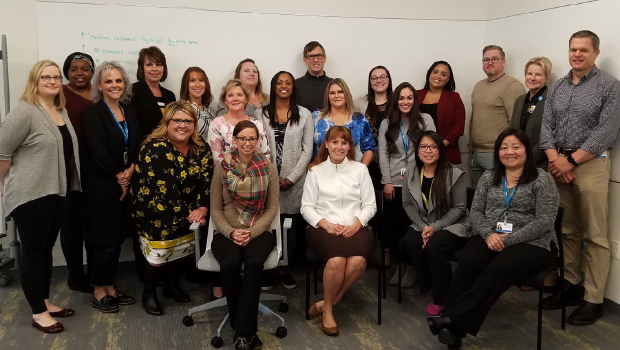Learning what works to bridge care and coverage

KPWHRI’s Implementation and Evaluation Associate Claire Allen and Programmer Sharon Fuller
Claire Allen describes how the Learning Health System Program is helping evaluate and improve an important initiative for our members.
By Claire Allen, an implementation and evaluation associate at Kaiser Permanente Washington Health Research Institute (KPWHRI) and a core team member of Kaiser Permanente Washington’s Learning Health System Program
When you go see your primary care provider, the result of that visit may be that you need follow-up care from a specialist. You immediately start asking yourself questions: How much will the next visit cost? When will I find time to schedule it? Will my insurance cover this? How do I get it authorized? Navigating the next step of care can be daunting for anyone. Now imagine that—before you even leave the clinic—the care team solves all this for you: They schedule your appointment, authorize the visit with your insurance, and tell you what the visit will cost you out of pocket.
Wouldn’t that be ideal? But it’s far from what most people experience—even within integrated health systems like Kaiser Permanente, which offer both care and coverage. But at Kaiser Permanente Washington, this ideal is on its way to becoming a reality because of an initiative called Bridging Care and Coverage (BCC).
Here’s how it works: After a primary care visit, providers can refer their patients to the BCC service for help navigating next steps in their care. Then a Patient Access Representative and a Member Services representative coordinate internal and external referrals and authorizations, schedule internal appointments, and explain cost implications based on a member’s health plan type. If a patient needs financial support, the team member will sign them up for Medical Financial Aid. The idea is to provide a ‘bridge to care’—giving our members a seamless care journey that’s free from delays and surprises.
BCC was launched in late 2018, with Kaiser Permanente Washington implementing it in 12 of our 32 primary care clinics. There are plans to launch the service systemwide by the end of 2020. Throughout 2019, the Learning Health System (LHS) Program partnered with the BCC team to provide data and implementation support through rapid-cycle learning to help make this new service even better as they spread it across our system.
Kicking off the BCC-LHS collaboration by overcoming a key hurdle
To date, more than 15,000 of our members have used the BCC service—and for those members, the average time it takes to get authorizations, appointments, and cost-share information dropped from days to just minutes after their appointment. Soon after the initiative launched, the BCC team started hearing stories about how the service eases members’ confusion, helps them make informed decisions, and speeds up their care journeys.
But stories about better member experience are even more powerful with data to back them up. And that’s where the LHS Program comes in.
The LHS Program exists to tap into the research institute’s scientific capabilities to help design, implement, and evaluate our care-delivery system’s priority initiatives. The initial purpose of the LHS program’s partnership with BCC was to evaluate how the service impacts utilization, access, and the experiences of members, providers, and staff.
But early in the BCC-LHS collaboration, we learned there was no way to track the members receiving the BCC service. Without the ability to identify the BCC population, we couldn’t evaluate specific impacts of the BCC service—for example, what effect was it having on members’ health and experience of care?
This hurdle could have stopped any effort at evaluation and data-driven improvement in its tracks. But under the leadership of Liz Johnson, senior director of Health Plan Operations, and Chris Berlin, MD, medical director of clinical referrals, the BCC team quickly shifted their focus to building tracking capabilities across the different data systems used by BCC team members. The LHS Program worked alongside frontline staff to find ways to integrate tracking into the BCC team’s workflow and connected the BCC team with a programmer at the research institute to build a tracking tool in the electronic medical record.
Early insights are promising—but there’s more to learn
While the BCC team rolled out the new tracking capabilities, the LHS Program leveraged data from multiple sources and developed creative workarounds to piece together data to tell the BCC story. We shared data as soon as it became available to help optimize implementation of BCC as it spread to new clinics. Key partners in this work at KPWHRI were programmer Sharon Fuller and postdoctoral fellow Andrew Berry, PhD. Sharon led the quantitative data gathering and analysis, while Andrew led the qualitative evaluation, which included clinic observations and interviews with members, providers, and staff.
What we learned echoed what the BCC team heard anecdotally:
- Members appreciate that BCC prevents surprises and reduces fear and worry about costs. One member said, “It's helpful to know what you're paying out of pocket first, before you go in, otherwise it's just a big surprise.”
- Providers like that it reduces referral errors and “closes the loop” on referrals, ensuring that their patients get the care they recommend. One provider commented, ‘“It's like packaging everything up into a nice little ball before they walk out the door. They’re more set up for success in our system and success in their health care needs.”
Quantitative data from the first 4 clinics to implement BCC also showed improvements in key areas of member experience, including in ease of scheduling appointments.
While these early results are encouraging, there’s still much more to learn about how BCC can help better meet our members’ needs. For example: Early data shows significant variability in how often providers refer patients to the BCC service and some clinics are using the service a lot more than others. To address this, the team will explore ways to ensure members who would benefit most consistently receive the service and will consider creative ways to reach those patients directly instead of relying on busy providers to connect the dots.

Members of the Bridging Care and Coverage team at Kaiser Permanente Washington.
Creating space for learning that benefits our members
The LHS Program looks forward to working with new BCC Program Manager Mirian Aguirre, who joined the team last month. Our next steps are to help the BCC team create an ongoing measurement and monitoring approach that integrates with the larger Referral Management Optimization initiative recently launched by Kaiser Permanente Washington.
The LHS Program aims to bring a data-driven, member-centered, and practical approach to evaluation and improvement. Our partners in care delivery are constantly moving forward, adapting to an ever-changing environment, and taking on multiple new initiatives at once—while still caring for patients. There often isn’t time to step back and ask: How well is this working? How can we make it better?
The BCC team created space to ask those vital questions in partnership with the LHS Program, and they put resources toward ongoing learning to ensure we’re doing the right thing for members. Growing from 1 clinic to 12 is no small feat, and a lot had to occur operationally to make that happen. Despite this, the BCC team showed a unique commitment to learning what works—and what doesn’t—to make their vision of seamless, coordinated care and coverage a reality for our members.
It’s a pleasure to be part of the BCC-LHS partnership and to work with so many dedicated colleagues in care delivery: Dr. Chris Berlin, Liz Johnson, Dr. Kelly O’Leary, Rachelle Hunt, Samira Shire, Amanda Lawson, Mirian Aguirre, and many others. From the BCC frontlines to the leadership, members have been at the center of all conversations and decisions. The experience of care for members is already getting better through the BCC service, and it’s rewarding to help improve the service on their behalf.